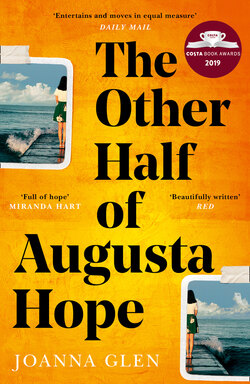Читать книгу The Other Half of Augusta Hope - Joanna Glen - Страница 25
Augusta
ОглавлениеMy mother was starting to circle possible destinations for the summer of 2004 in red biro, and I asked Mr Sánchez whether Spain would be a good place for a holiday.
‘I’d avoid the Costa del Sol, Augusta,’ said Mr Sánchez. ‘It’s full of English people!’
Then we both laughed like conspirators, as if we knew how boring English people were, and I started to wonder if I were actually Spanish and the stork (ha ha) had dropped me in the wrong place. I obviously knew quite a bit about sex by now – and not only from the scenes in An Instant in the Wind. No, the internet had arrived – at other people’s houses. My parents continued to favour paper. My mother had bought us a book on sex, and she threw it into our hands, keeping the focus on how special it was to have babies, a great privilege for every woman, she kept saying.
‘Not for every woman,’ I said. ‘Some women can’t have children.’
She gave me the you’re-being-difficult look so I didn’t bother to bring up the way the privilege could also be suffering, or the way Barbara Cook loved and suffered every day of being a mother so that the two things became one. I didn’t bother to talk about the fact that love might be the hugest word there is in the world and that we would never, across a whole lifetime, work out what it meant. I didn’t say that if we put love on one side of the weighing scales and suffering on the other, we might change our minds and decide suffering was bigger. Then I found myself wondering if actually love and suffering were on the same side of the scales. And you couldn’t have the one without the other. Then I couldn’t decide what was on the other side of the weighing scales. But I didn’t say any of this aloud, and my mother went on running through her list of warnings against the use of tampons, in particular the risk of toxic shock syndrome.
‘But, quite apart from that,’ she said, ‘they can be extremely painful when you put them in your. Put them in your. Put them in your.’
She never found the word.
‘Vagina,’ I said.
My mother squeezed the new packet of extra-thin sanitary towels she was holding in her hand at the shock of the word said aloud, and she started to talk about holidays instead, putting down the sanitary towels and picking up her holiday spiral notepad.
‘Spain is supposed to be very safe,’ I said. ‘And I would also be able to practise my Spanish like we practised French in Brittany.’
Spain, my mother wrote, underlining it twice.
The Alvárez family’s Spanish house wasn’t on the Costa del Sol, but on the Costa de la Luz, I told my mother. In a village by the beach, called La Higuera. Which means fig tree. Higos are figs and you don’t pronounce the h.
The next year, in August, Diego’s family would be going to Argentina for a family wedding so we could (possibly) rent their holiday house with fig trees in the garden for a much-reduced price. They’d be going at Christmas for the special festivals.
My father said, ‘It’s all very different out there. Apparently, Lola sunbathes without a swimsuit on in the garden. They probably all do that sort of thing over there. And it’s jolly hot, you know, in summer. Sweltering. It may not suit us.’
He was right.
It didn’t suit him.
Yet we plotted and persuaded to get him there.
I look around me as I write, here in La Higuera, thirteen years after we first came. How I love its fig trees and its palms, its warm air and wild winds.
There we were, innocent and dreamy.
So excited.
‘Two months to go,’ I said to Julia, crossing off another day on the chart we’d stuck to the back of the wardrobe door.
‘Will we be different when we come back?’ said Julia.
‘Course we will,’ I said, smiling.
I remember us packing for Spain, suitcases open on the bed and the sun coming through the bedroom window and landing in that little pool, over in the corner, where there was, where there is, one of those triangular-shaped stands, made to fit in corners. On it are our awards – all my academic cups, made of fake silver, and my one riding rosette clipped to the top, and Julia’s dancing trophies in the shape of gold ballet shoes. I remember specks of dust falling through the sheet of light, bits of our own skin.
I’m looking down at my hand, brown from the sun because I live here now.
The skin of my hand.
Mano in Spanish.
Mano mano mano – man-o – man-oeuvre – man-overboard – man-o-tee, but I think it’s manatee actually.
They are sometimes called sea cows – dolphin things with rounded noses. Like the pilot whales we saw from the boat out in the Straits of Gibraltar, heading off from the port at Tarifa.
That day.
